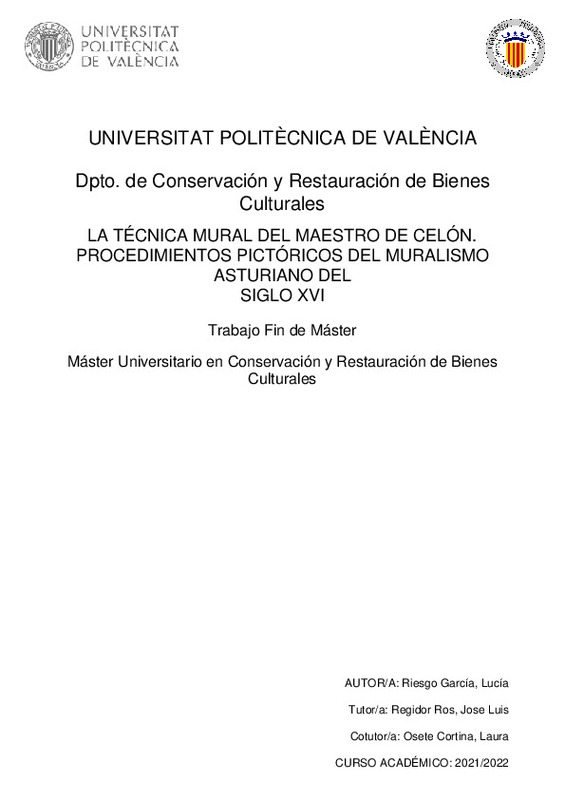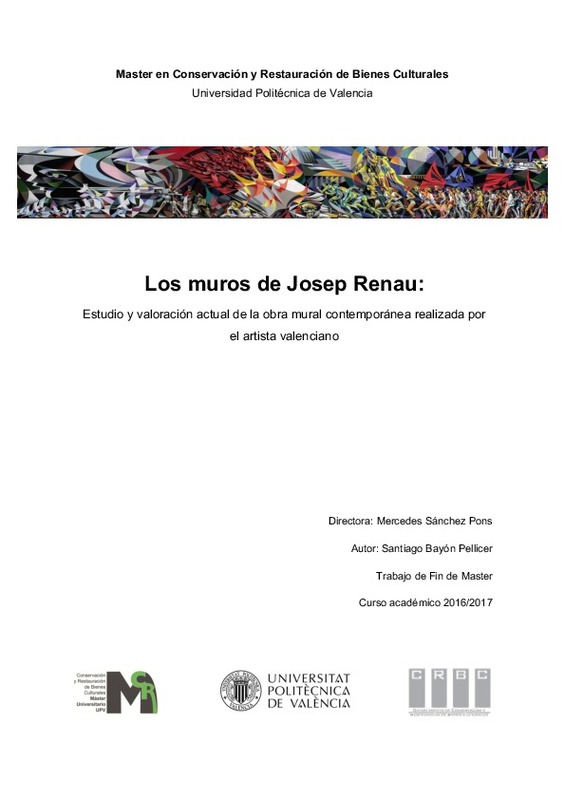|
Resumen:
|
[ES] En el presente Trabajo Fin de Máster se realiza una aproximación a la caracterización de la técnica
mural empleada por el Maestro de Celón en la Iglesia de Santa María de Celón, en el concejo de Allande,
Asturias. ...[+]
[ES] En el presente Trabajo Fin de Máster se realiza una aproximación a la caracterización de la técnica
mural empleada por el Maestro de Celón en la Iglesia de Santa María de Celón, en el concejo de Allande,
Asturias. Es considerado una figura clave en el ámbito de la pintura mural asturiana del siglo XVI, no solo
por su complejidad pictórica en relación a sus contemporáneos, sino también por la expresividad y dinamismo patente en sus obras. Esta investigación se enmarca en el contexto histórico-artístico del muralismo asturiano de este periodo a partir de diferentes templos seleccionados en base a su cronología,
procedimiento pictórico, estilo e iconografía, permitiendo establecer patrones formales y estilísticos de
ésta tradición pictórica popular.
Para la realización de este estudio se ha optado por el empleo de técnicas no invasivas, como fotografías generales, de detalle y de 360°; y microinvasivas, mediante la realización de extracciones micrométricas, cuyos resultados permitan proporcionar un soporte concluyente para definir matérica, estratigráfica, tipológica y patológicamente los revestimientos murales.
Adicionalmente se efectúa un análisis comparativo de los resultados obtenidos en dicho estudio y
los referentes a las obras pertenecientes a los muros norte y este del ábside de la Iglesia de San Miguel
de Lillo en el concejo de Oviedo, desarrollados por la Asesoría Geológica GEA en los Estudios previos
de caracterización de la pintura mural de la Iglesia de San Miguel de Lillo en Oviedo, con el propósito de
probar la hipótesis de que se trate de una autoría común. Éstas fueron recientemente descubiertas durante el proyecto de conservación y restauración de las pinturas y revestimientos murales de la misma,
desarrollado por el Instituto del Patrimonio Cultural de España, pareciendo establecer una relación más
evidente entre otras obras ya atribuidas al Maestro en Santa María de Celón y Santa María de Restiello.
[-]
[EN] This Master's Thesis is an approach to the characterisation of the mural technique used by the Master
of Celón in the Church of Santa María de Celón, in the municipality of Allande, Asturias. He is considered
a key ...[+]
[EN] This Master's Thesis is an approach to the characterisation of the mural technique used by the Master
of Celón in the Church of Santa María de Celón, in the municipality of Allande, Asturias. He is considered
a key figure in the field of 16th century Asturian mural painting, not only for his pictorial complexity
in relation to his contemporaries, but also for the expressiveness and dynamism evident in his works. This research is framed in the historical-artistic context of Asturian mural painting of this period,
based on different temples selected on the basis of their chronology, pictorial procedure, style and
iconography, allowing us to establish formal and stylistic patterns of this popular pictorial tradition.
In order to carry out this study we have opted for the use of non-invasive techniques, such as general,
detailed and 360° photographs; and micro-invasive techniques, by means of micrometric extractions,
the results of which provide a conclusive support to define the material, stratigraphic, typological and
pathological nature of the wall coverings.
In addition, a comparative analysis is made of the results obtained in this study and those relating
to the works belonging to the north and east walls of the apse of the Church of San Miguel de Lillo in the council of Oviedo, developed by the GEA Geological Consultancy in the previous characterisation studies of the mural paintings of the Church of San Miguel de Lillo in Oviedo, with the aim
of testing the hypothesis of a common authorship. These were recently discovered during the project
for the conservation and restoration of the paintings and wall coverings of the church, carried out by
the Spanish Cultural Heritage Institute, and seem to establish a more evident relationship between
other works already attributed to the Master in Santa María de Celón and Santa María de Restiello
[-]
|










